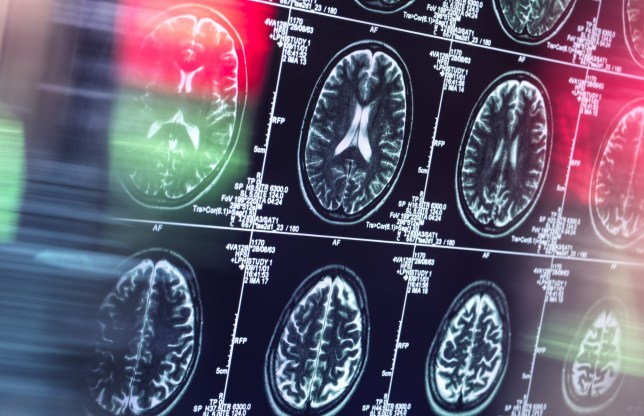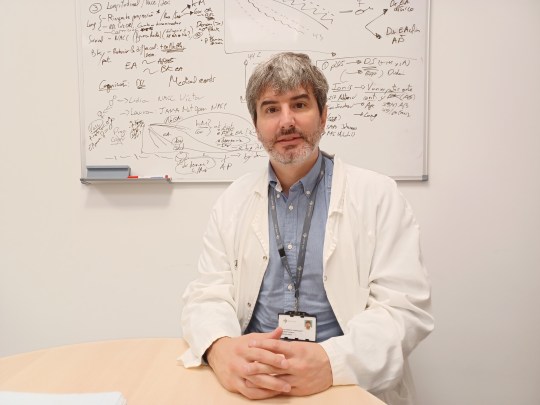Scientists have identified a new form of Alzheimer’s disease, which could help find those who will develop the condition and allow treatment to start earlier.
The finding underscores the urgent need for specialised treatment and prevention strategies, they said.
Researchers found that almost everyone who carries two copies of the APOE4 gene variant, known as APOE4 homozygotes, are likely to develop signs of the neurological condition.
The gene is already associated with a higher risk of developing Alzheimer’s.
But scientists now believe that 95% people who are over 65 and carry two copies of APOE4 show early signs of the disease, making it a distinct genetic form of Alzheimer’s.
People with the genes also develop the condition earlier than those with other variants of the APOE gene, they added.
However, UK experts are not recommending people concerned about developing the disease undergo genetic testing, yet.
What is Alzheimer’s and what are the symptoms?
Alzheimer’s disease is the most common cause of dementia in the UK.
Dementia is the name for a group of symptoms associated with an ongoing decline of brain functioning. It can affect memory, thinking skills and other mental abilities.
For example, someone with early Alzheimer’s disease may:
- forget about recent conversations or events
- misplace items
- forget the names of places and objects
- have trouble thinking of the right word
- ask questions repetitively
- show poor judgement or find it harder to make decisions
- become less flexible and more hesitant to try new things
Later stage symptoms include increasing confusion and disorientation, obsessive or repetitive behaviour, or disturbed sleep.
Source: NHS
The findings, published in the journal Nature Medicine, are based on clinical data from more than 10,000 people, as well as pathological data from more than 3,000 brain donors.
Dr Juan Fortea, a director at the Sant Pau Research Institute in Barceclona, Spain, said: ‘This gene has been known for over 30 years and it was known to be associated with a higher risk of developing Alzheimer’s disease.
‘But now we know that virtually all individuals with this duplicated gene develop Alzheimer’s biology.’
He said the findings are important because between 2% and 3% of the general population and carry the APOE4 homozygotes.
This supports the need to develop specialised research strategies, treatment approaches and clinical trials for these people, the researchers said.
Dr Reisa Sperling, professor in neurology at Harvard Medical School, added: ‘This research really suggests that we should be treating them quite early, at a younger age and at an early stage of pathology because we know they are very likely to progress to impairment quickly.
‘So we have to think about how we can treat APOE4 carriers.’
Dr Sperling, who is also director of the Centre for Alzheimer Research and Treatment at Brigham and Women’s Hospital in Boston, added: ‘These individuals are desperate – they have seen [the disease] in both of their parents.’
Mutations in three genes, APP, PSEN1 and PSEN2, are known to cause a rare form of Alzheimer’s known as ADAD – early-onset autosomal dominant Alzheimer’s disease.
This form of the disease runs in families.
APOE is one of many other genes associated with Alzheimer’s and comes in three different variations: APOE2, APOE3, and APOE4.
Everyone carries two copies of APOE, one inherited from each parent.
Previous studies have shown that having at least one APOE4 gene variant, which about 25% of people in the UK are thought to carry, almost triples the risk of getting the disease, while having two copies increases the risk by up to twelve-fold.
In the current research, the team found a majority of people with two copies of APOE4 showed signs of the disease by the age of 55, compared with those with another gene variant, such as APOE3.
And by the age of 65, 95% had abnormal levels of amyloid protein in the fluid that surrounds the brain and spinal cord – a key sign of Alzheimer’s disease.
Scans showed that 75% of those over 65 with the double gene had abnormal build-up of amyloid protein in the brain, which is seven to 10 years earlier than symptom development for other APOE variants.
Commenting on the study, Professor Jonathan Schott, chief medical officer at Alzheimer’s Research UK, said: ‘At the present time we do not advise that people have genetic testing for APOE except when taking part in research, but this may change in the future.’
He said that Alzheimer’s UK is funding research projects to try to understand why having the APOE4 gene increases the risk of disease.
Dr Richard Oakley, Alzheimer’s Society’s associate director of research and innovation, added: ‘This study has shown us that this particular gene might play an important role in Alzheimer’s disease development, suggesting its presence is not only a risk factor, but could also indicate a new form of Alzheimer’s disease.
‘The insights from the study suggest that in the future it could be important to take into account a person’s genetics when planning how to reduce their risk of developing Alzheimer’s disease, or when considering their treatment if they already have the disease.’
MORE : I had a four-month period – it’s ruined my life
MORE : Paris Saint-Germain can edge Borussia Dortmund and close in on long-awaited Champions League success
MORE : Mysterious symbols in ancient temple could be world’s oldest Catchphrase
Get your need-to-know
latest news, feel-good stories, analysis and more
This site is protected by reCAPTCHA and the Google Privacy Policy and Terms of Service apply.












